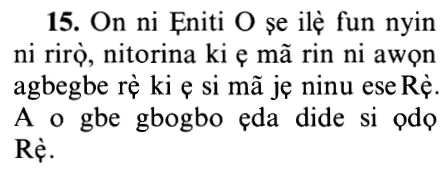67vs15
Select any filter and click on Go! to see results
Yoruba Translation

Hausa Translation
Shi, (Allah), Yã sanya muku ƙasa hõrarriya, sai ku tafi cikin sãsanninta, kuma ku ci daga arzikinSa, kuma zuwa gare shi ne tãshin yake.
Asbabu n-Nuzuul (Occasions of Revelation)
Allah's Favor of subjugating the Earth to His Servants
Then Allah mentions His favor to His creation in subjugating the earth to them, and making it subservient to them. This is by His making it a stable abode and dwelling place. He placed in it mountains and caused water springs to gush forth from it. He fashioned pathways, and placed useful things in it and places fertile for the growth of fruit and vegetation. Allah says,
هُوَ الَّذِي جَعَلَ لَكُمُ الْأَرْضَ ذَلُولًا فَامْشُوا فِي مَنَاكِبِهَا...
He it is Who has made the earth subservient to you; so walk in the paths thereof,
meaning, travel wherever you wish throughout its regions and frequent its countryside's and all the areas of its domain in your various journeys to seek earnings and trade. And know that your efforts will not benefit you anything unless Allah makes matters easy for you.
Ibn `Abbas, Mujahid, As-Suddi and Qatadah all said that مَنَاكِبِهَا Manakibiha (its paths) means its outermost borders, its roads and its regions.
Allah continues to say,
... وَكُلُوا مِن رِّزْقِهِ ...
and eat of His provision.
Thus, striving by using the means (to attain something) does not negate the necessity of depending upon Allah (At-Tawakkul).
This is similar to what Imam Ahmad recorded from `Umar bin Al-Khattab, that he heard the Messenger of Allah say,
لَوْأَنَّكُمْ تَتَوَكَّلُونَ عَلَى اللهِ حَقَّ تَوَكُّلِهِ، لَرَزَقَكُمْ كَمَا يَرْزُقُ الطَّيْرَ، تَغْدُو خِمَاصًا وَتَرُوحُ بِطَانًا
If you would trust in Allah as He truly should be trusted in, He would surely provide for you as He provides for the birds. They set out in the morning with empty stomachs and return in the evening with full stomachs.
At-Tirmidhi, An-Nasa'i and Ibn Majah all recorded this Hadith. At-Tirmidhi said, "Hasan Sahih.''
So this confirms that the bird searches morning and evening for its sustenance while depending upon Allah. For He is the Subduer, the Controller and the One Who causes everything.
... وَإِلَيْهِ النُّشُورُ ﴿١٥﴾
And to Him will be the resurrection.
meaning, the place of return on the Day of Judgement.
Ibn `Abbas, Mujahid, As-Suddi and Qatadah all said that مَنَاكِبِهَا Manakibiha (its paths) means its outermost borders, its roads and its regions.
قال تعالى " هو الذي جعل لكم الأرض ذلولا فامشوا في مناكبها" أي فسافروا حيث شئتم من أقطارها وترددوا في أقاليمها وأرجائها في أنواع المكاسب والتجارات واعلموا أن سعيكم لا يجدي عليكم شيئا إلا أن ييسره الله لكم ولهذا قال تعالى " وكلوا من رزقه " فالسعي في السبب لا ينافي التوكل كما قال الإمام أحمد حدثنا أبو عبد الرحمن حدثنا حيوة أخبرني بكر بن عمرو أنه سمع عبد الله بن هبيرة يقول إنه سمع أبا تميم الجيشاني يقول إنه سمع عمر بن الخطاب يقول إنه سمع رسول الله صلى الله عليه وسلم يقول " لو أنكم تتوكلون على الله حق توكله لرزقكم كما يرزق الطير تغدو خماصا وتروح بطانا " رواه الترمذي والنسائي وابن ماجه من حديث ابن هبيرة وقال الترمذي حسن صحيح فأثبت لها رواحا وغدوا لطلب الرزق مع توكلها على الله عز وجل وهو المسخر المسير المسبب " وإليه النشور " أي المرجع يوم القيامة قال ابن عباس ومجاهد والسدي وقتادة : مناكبها أطرافها وفجاجها ونواحيها وقال ابن عباس وقتادة أيضا مناكبها الجبال وقال ابن أبي حاتم حدثنا أبي حدثنا عمرو بن حكام الأزدي حدثنا شعبة عن قتادة عن يونس بن جبير عن بشير بن كعب أنه قرأ هذه الآية " فامشوا في مناكبها " فقال لأم ولد له : إن علمت ما مناكبها فأنت عتيقة فقالت هي الجبال فسأل أبا الدرداء فقال هي الجبال .
"هو الذي جعل لكم الأرض ذلولا" سهلة للمشي فيها "فامشوا في مناكبها" جوانبها "وكلوا من رزقه" المخلوق لأجلكم "وإليه النشور" من القبور للجزاء
أي سهلة تستقرون عليها . والذلول المنقاد الذي يذل لك والمصدر الذل وهو اللين والانقياد . أي لم يجعل الأرض بحيث يمتنع المشي فيها بالحزونة والغلظة . وقيل : أي ثبتها بالجبال لئلا تزول بأهلها ; ولو كانت تتكفأ متمائلة لما كانت منقادة لنا . وقيل : أشار إلى التمكن من الزرع والغرس وشق العيون والأنهار وحفر الآبار .
I'raab - grammatical analysis of the Qur'an
«هُوَ الَّذِي» مبتدأ وخبره والجملة استئنافية لا محل لها «جَعَلَ» ماض فاعله مستتر «لَكُمُ» متعلقان بالفعل «الْأَرْضَ» مفعول به أول «ذَلُولًا» مفعول به ثان والجملة صلة «فَامْشُوا» الفاء الفصيحة وأمر وفاعله «فِي مَناكِبِها» متعلقان بالفعل والجملة جواب شرط مقدر لا محل لها «وَكُلُوا مِنْ رِزْقِهِ» معطوف على ما قبله «وَإِلَيْهِ النُّشُورُ» خبر مقدم ومبتدأ مؤخر والجملة حال.
